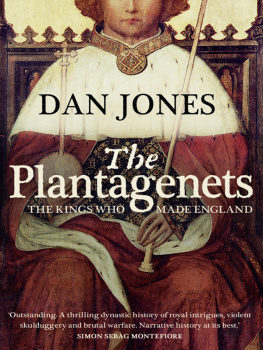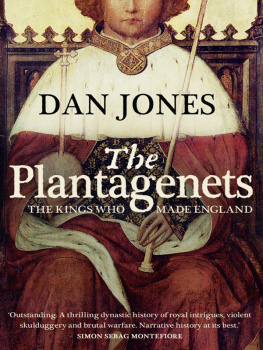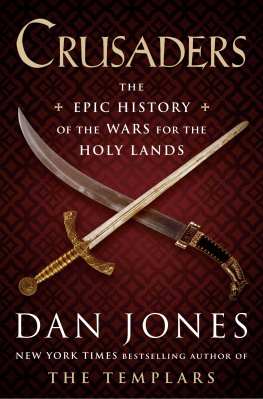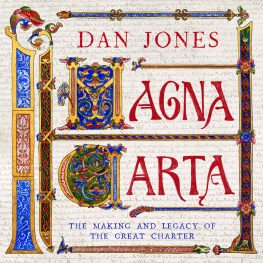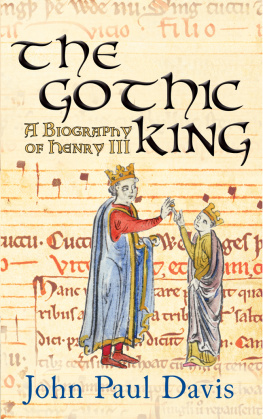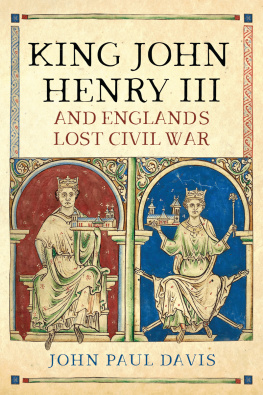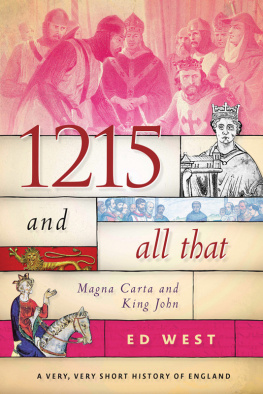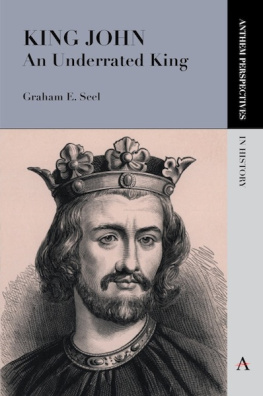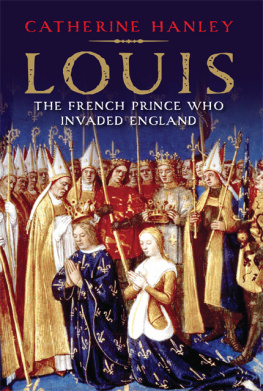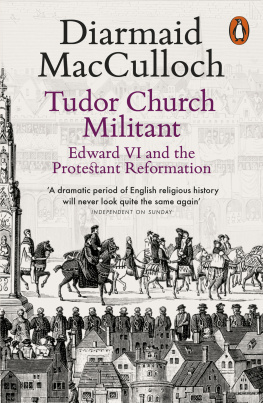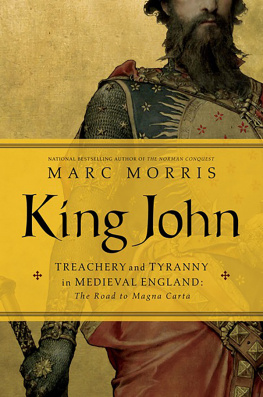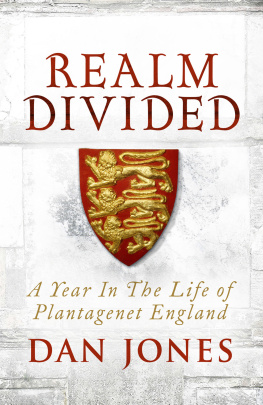In The Reign
of
King John

British Library Board / Bridgeman Images
DAN JONES
In The Reign
of
King John
A Year in the Life of Plantagenet England
AN APOLLO BOOK
www.headofzeus.com
First published in 2015 by Head of Zeus Ltd
as Realm Divided, A Year in the Life of Plantagenet England
This illustrated edition first published in 2020 by Head of Zeus Ltd.
Copyright Dan Jones 2015
The moral right of Dan Jones to be identified as the author of this work has been asserted in accordance with the Copyright, Designs and Patents Act of 1988.
All rights reserved.
No part of this publication may be reproduced, stored in a retrieval system, or transmitted in any form or by any means, electronic, mechanical, photocopying, recording, or otherwise, without the prior permission of both the copyright owner and the above publisher of this book.
A catalogue record for this book is available from the British Library.
ISBN : 9781800240643
Head of Zeus Ltd
First Floor East
58 Hardwick Street
London EC1R 4RG
www.headofzeus.com
Contents
In memoriam
H.E.
Que sunt,
sicut sunt
Frederick II Hohenstaufen
(11941250)
P lantagenet England witnessed many dramatic years across its long history. Years of war, years of revolution. Years of popular uprising and devastating plague. Years of triumph, years of humiliation. But few, perhaps none, of these years were as dramatic or as significant as 1215. It was a year of enormous political upheaval and constitutional invention; of rebellion, civil war, siegecraft, religious contention. It was the year that blackened forever the name of the ruling King John, and very nearly swept his royal dynasty out of the pages of British history. It produced the first, short-lived grant of Magna Carta. If we are to think of milestones beside the long road of the Middle Ages, then 1215 is easily as important a year as 1066, which saw the Norman invasion, or 1485, when the Battle of Bosworth brought the Tudor dynasty into power.
For some, it was all rather painful. When the biographer of William Marshal, the greatest knight to have lived during the Plantagenet age, came to this particular year in his vibrant nineteen-thousand-word verse story (committed to parchment between 1219 and around 1226), he glossed over the events of 1215 with a wince. There were many incidents, the biographer wrote, which it would not be profitable to relate.
In truth, he couldnt help himself. As is so often the way with William Marshals biography, the desire of the writer to be modest on his subjects behalf seldom outweighed his wish to show off how much he knew about great events. So, having written that he had nothing to say about 1215, he immediately went on to provide a succinct and perspicacious summary of the political dispute that boiled up and produced a great charter, a massive civil war and a full foreign invasion:
Suffice it to say that what happened was
that the barons came to the King
and asked him to grant them their privileges.
He refused them, and
most of them present said
that, if they did not have their privileges,
then he could rest assured
that they would leave his service;
he might also rest assured that
he could not place his trust
in them, and that they would do him harm
in every way possible.

King Henry I on his throne, in an illustration from the Chronicle of England by Peter of Langtoft ( c .130727). Henry is mourning the death of his son and heir, William the Aetheling, who perished in the sinking of the White Ship..
Bridgeman Images
Looked at one way, this is indeed the essence of what happened in 1215, in high politics at least. There was a serious collapse in relations between the third Plantagenet king of England, John, and his barons, which tore the country down the middle. At Runnymede, near Windsor, in June 1215 a large party of Johns barons, allied with churchmen including the impressive and scholarly archbishop of Canterbury, Stephen Langton, demanded that the king confirm in writing (and certify with his Great Seal) a long list of rights and royal obligations that they felt he and his predecessors had neglected, ignored and abused for too long. These rights and obligations were conceived partly as constitutional innovation and partly as a return to a semi-imaginary ancient law-code that had governed a better, older England, which lay in the historical memory somewhere between the days of the last Saxon king, Edward the Confessor, and the more recent times of Johns Norman great-grandfather, Henry I. They touched on matters of religion, tax, justice, military service, feudal payments, weights and measures, trading privileges and urban government. Occasionally, they reached for grand principle: famously, John was forced to promise that no free man is to be arrested, or imprisoned, or disseized, or outlawed, or exiled, or in any other way ruined, nor will we go or send against him, except by the legal judgment of his peers or by the law of the land, and that to no one will we sell, to no one will we deny or delay, right or justice. Otherwise, what was at issue in 1215 was a tight-knit and technical shopping list of feudal demands that was mainly of interest to (and in the interests of) a tiny handful of Englands richest and most powerful men, and which applied only to free men: at best twenty percent of Englands adult population.
It has been our tendency to see the granting of Magna Carta, and its supposed invention of the principles of personal liberty, limited monarchy and restrained government, as the whole story of 1215. This is a big mistake. In fact, the key clause of Magna Carta, often overlooked but absolutely essential to the run of events in the year that produced it and to the life of everyone in England at the time, was that which proposed a conceptually neat but disastrously flawed method for compelling the king to stick to what he had promised. If John reneged on the charter, ran the clause, his barons would renounce their personal loyalty to him, thus invalidating the central relationship on which the whole structure of thirteenth-century society depended. To use Marshals biographers phrase, they would do him harm in every way possible. To put it even more simply, they would start a war. This grave threat was reflected in the words of the charter itself, in which John acknowledged that if he failed to keep the promises he had made, then his barons could distrain and distress us by taking castles, lands, possessions saving our person and the persons of our queen and children.
And that is precisely what happened. When we run the tape of 1215 on from the month of June and the glorious moment of baronial victory at Runnymede, we see a rather different picture of the year beginning to emerge. Yes, Johns barons had compelled him to grant them a charter of rights and privileges, but they had done so on terms that effectively guaranteed a fight to the death. The king began to wriggle out from beneath the charters strictures almost as soon as the seal-wax was dry. In 1215 Magna Carta was only legally valid for a little over two months, whereupon it was declared shameful and demeaning illegal and unjust by the Pope, who pronounced that any man who observed the charter would incur the anger of Almighty God and of St Peter and St Paul His apostles: a polite way of saying that they would burn in the fires of Hell for all eternity. During the full-blown civil war that followed, towns and castles were besieged, men were slaughtered, the royal treasure was (infamously) lost in boggy ground near the Wash and the French kings heir was invited to England to replace John. Once the war was ended by Johns death from dysentery during the night of 1819 October 1216, almost no one would have believed that the charter agreed the previous year was anything more than a brave but flawed attempt to restrain a king, which had failed in the most emphatic circumstances imaginable.




